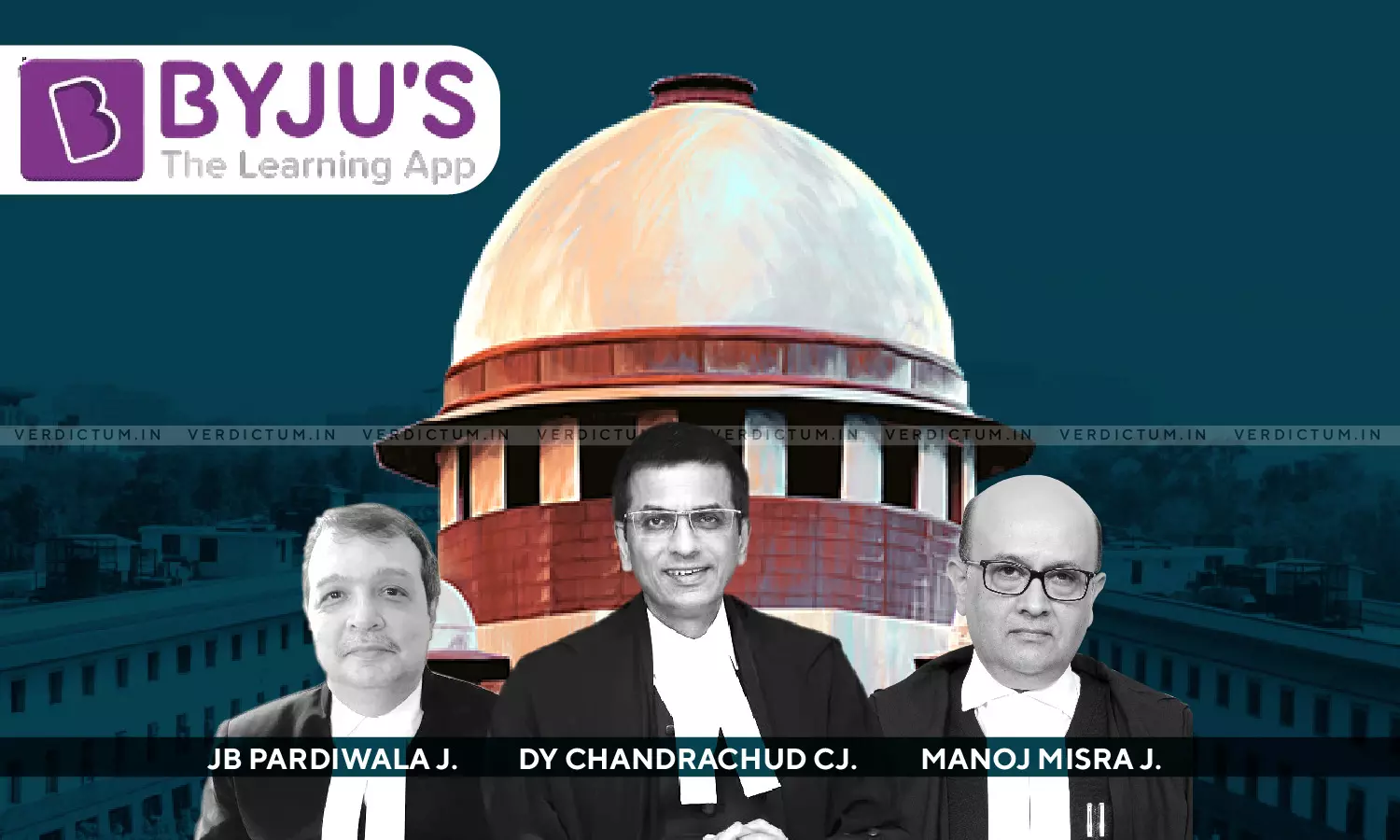
Inherent Power Can't Be Invoked To Circumvent Carefully Crafted CIRP Withdrawal Procedure: SC Sets Aside NCLAT’s Order Approving Settlement Between BYJU’s & BCCI
 |
|The Supreme Court has set aside the NCLAT’s order approving a settlement between BYJU’s and BCCI holding that permitting the NCLAT to circumvent the detailed procedure by invoking its inherent powers under Rule 11 of the NCLAT Rules would run contrary to the carefully crafted procedure for withdrawal of a CIRP.
The Bench allowed the appeal filed by the GLAS Trust Company LLC (appellant) challenging the National Company Law Appellate Tribunal’s (NCLAT) decision to close the insolvency proceedings against BYJU’s which approved BYJU’s settlement with the Board of Control for Cricket in India (BCCI).
The Court clarified that the correct course of action by the NCLAT would have been to stay the constitution of the Committee of Creditors (CoC) and direct the parties to follow the course of action in Section 12A of the Insolvency and Bankruptcy Code (IBC) read with Regulation 30A of the CIRP Regulations 2016.
A Bench of Chief Justice Dhananjaya Y Chandrachud, Justice JB Pardiwala and Justice Manoj Misra held, “We are of the view that recourse to Rule 11 of the NCLAT Rules was not warranted in the present circumstances. As noted above, ‘inherent powers’ cannot be used to subvert legal provisions, which exhaustively provide for a procedure. To permit the NCLAT to circumvent this detailed procedure by invoking its inherent powers under Rule 11 would run contrary to the carefully crafted procedure for withdrawal. In the Impugned Judgement, the NCLAT does not provide any reasons for deviating from this procedure or the urgency to approve the settlement without following the procedure.”
Senior Advocates Kapil Sibal and Shyam Divan represented the appellant, while Senior Advocates including Abhishek Manu Singhvi, Neeraj Kishan Kaul and Tushar Mehta appeared for the respondents.
In 2023, the BCCI moved a petition under Section 9 of the IBC, in respect of an operational debt of approximately Rs 158 crore against BYJU’s Think and Learn Pvt. Ltd., leading to the initiation of a Corporate Insolvency Resolution Process (CIRP) by the National Company Law Tribunal (NCLT). Subsequently, BYJU’s, through its former director, Riju Raveendran, approached the NCLAT to approve a settlement with the BCCI, without complying with the prescribed withdrawal procedures under Section 12A of the IBC and Regulation 30A of the CIRP Regulations, 2016.
The NCLAT had held that in the absence of any evidence to the contrary, there was no reason to believe that the money for the settlement that Riju Raveendran, former director of BYJU’s, was offering was linked to the money disbursed to BYJU’s Alpha Inc. under the Credit Agreement or from the coffers of the Corporate Debtor.
The appellant contends that the NCLAT erred in invoking its inherent powers under Rule 11 of the NCLAT Rules in the presence of a prescribed procedure dealing with the withdrawal of CIRP. The respondent, on the other hand, contends that at the time of executing the settlement agreement, the CoC was not formed and in such situations, Rule 11 of the NCLAT Rules may be invoked to allow the settlement.
The Supreme Court agreed with the argument advanced by the Appellant and held that the NCLAT had bypassed the procedure under the IBC, including the requirement that the settlement proposal be moved through the Interim Resolution Professional (IRP) and placed before the NCLT for approval. Furthermore, the NCLAT's reliance on Rule 11 ignored the fact that the CIRP proceedings, once initiated, become collective in nature, involving all creditors, not just the operational creditor and corporate debtor involved in the settlement.
The Court noted the “grave deviations” by the NCLAT which proceeded with approving the settlement and setting aside the CIRP by invoking its inherent power under Rule 11 of the NCLAT Rules.
“First and foremost, there was no formal application instituted to seek the withdrawal of the CIRP. The settlement agreement was taken on record and approved by the NCLAT based on the submissions and assurances of the counsel before it and the affidavits/undertakings filed by the parties. Further, the first respondent, who is a former director of the Corporate Debtor, did not move the application through the IRP and instead approached the NCLAT directly. Finally, the request to approve the settlement was moved before the NCLAT during appellate proceedings, instead of being placed before the NCLT,” the Bench remarked.
“Even if the procedural infirmity is kept aside, once the CIRP was admitted, the proceedings became collective, and all creditors of the Corporate Debtor became stakeholders,” the Bench remarked.
Consequently, the Court held, “For the above reasons, we allow the present appeal and set aside the impugned judgment of the NCLAT dated 2 August 2024 in the above terms.”
Accordingly, the Supreme Court allowed the appeal.
Cause Title: GLAS Trust Company LLC v. BYJU Raveendran & Ors. (Neutral Citation: 2024 INSC 811)
Appearance:
Appellant: Senior Advocates Kapil Sibal and Shyam Divan; Advocates Prateek Kumar, Raveena Rai, Smriti Nair, Nishant Sharma, Anshula Laroiya and Manisha Singh
Respondents: Senior Advocates Abhishek Manu Singhvi, Neeraj Kishan Kaul, Tushar Mehta, Ramji Srinivasan, S. Niranjan Reddy and Gopal Sankaranarayanan; AOR A. Karthik, Sahil Bhalaik, Shivani Vij, Syed Jafar Alam; Advocates Zulfiquar Memon, Rishabh Gupta, Waseem Pangarkar, Mrinal Bharti, R. Sudhinder, Adity Chaudhury, Bhavya Mohan, Rahul Dev, Trisha Chandran, Shankh Sengupta, Tine Abraham, Yogesh Singh, Manasa Sundarraman, et al